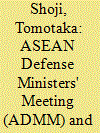| Srl | Item |
| 1 |
ID:
128973


|
|
|
|
|
| Publication |
2013.
|
| Summary/Abstract |
This paper explores the ASEAN Defense Ministers' Meeting (ADMM) and the ADMM Plus, focusing
on ASEAN's purpose to launch a meeting of defense ministers in terms of community building, the
evolution of the ADMM with the ensuing establishment of its enlarged version - the ADMM Plus, and
the significance of the ADMM Plus from a comparative perspective. A brief analysis of the approach
taken by Japan toward this multilateral framework, as a long-time dialogue partner of ASEAN, is
added to the conclusion. Generally, the ADMM and the ADMM Plus processes have so far developed
steadily, materializing in an incremental way the original visions to promote institutionalization
and practical cooperation. It is highly likely that the ADMM Plus will regularize the annual joint
exercises in nontraditional security based on the system of rotational Expert Working Groups
(EWGs). Activities in the ADMM (Plus) imply ASEAN's strong will to differentiate the framework
from the ASEAN Regional Forum (ARF), which countries concerned have found to be ineffective
for promoting conflict prevention and dealing with confrontational, sensitive issues of traditional
security, like the South China Sea. Today, the participants in the ADMM Plus including Japan seem
to fully recognize the utility of the platform. This is not only in terms of having a regular meeting
venue of relevant defense ministers, but also fostering deeper cooperation of defense and security by
conducting meetings at various levels of defense officials and joint exercises in nontraditional security
areas. However, the participants in the multilateral framework are going to see some future challenges
for the relevance of the mechanism, including territorial and maritime disputes.
|
|
|
|
|
|
|
|
|
|
|
|
|
|
|
|
| 2 |
ID:
119222


|
|
|
|
|
| Publication |
2013.
|
| Summary/Abstract |
This article examines why Asia's multilateral defence diplomacy has been a relative laggard when compared to other forms of institutionalized security dialogue, and what explains its recent rise. It argues that explanations that stress the "catalytic role" of external shocks such as the Asian Financial Crisis (AFC) or changes in the distribution of power or threats are underdetermining. Rather, Asia's new multilateral defence diplomacy reflects strategic emulation on the part of ASEAN elites, who localized ideas initially put forward by outsiders in order to maintain ASEAN's central place in the regional security architecture. Its rise has also been helped by the changing role of militaries in some East Asian states and its rapid institutionalization owes much to historical contingency, in particular the interests of two influential ASEAN Chairs in Indonesia and Vietnam. The final part of the article briefly assesses the future prospects and influence of regional multilateral defence diplomacy.
|
|
|
|
|
|
|
|
|
|
|
|
|
|
|
|